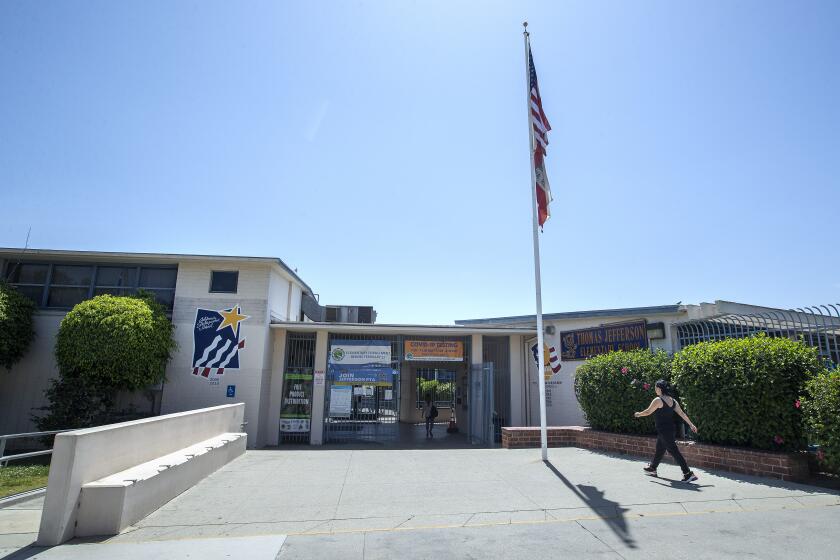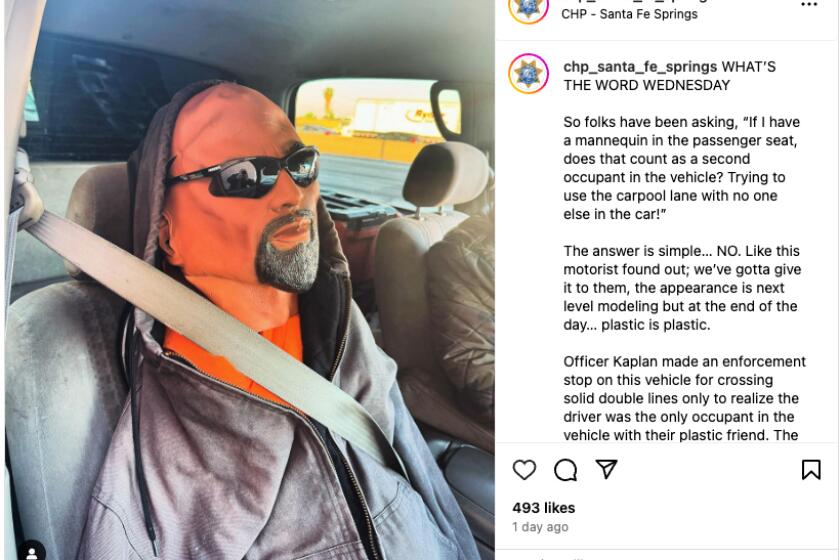Gift to college honors the memory of a son
As a crowd of over 200 gathered to dedicate Cal State Fullerton’s Roy Lopez Army ROTC Obstacle Course for students in their Reserve Officer’s Training Corps program last month, no one could have known the leaps and hurdles the course’s namesake faced in his 21 years.
Roy Anthony Lopez joined the school’s Army ROTC program on campus when he was 19, and in many ways it helped reinforce the discipline and structure in his life, his family said.
By enrolling in ROTC, Lopez took classes like Army history and military instruction with the intent of receiving military commission after graduation.
But he would never get the chance to graduate or be commissioned.
In the time leading up to Nov. 27, 2012 — the night Lopez took his life in his family’s Huntington Beach home — the young cadet faced overwhelming events: He had endured a rocky relationship with a girlfriend, withdrawn from a training program in Kentucky and been on the receiving end of nasty social media messages from peers.
After the loss of her son, Lopez’s mother, Adriana Mraz, committed to donating $150,000 for an obstacle course to be named after him. Since a course of this type would cost $200,000, other donors stepped in to help make up the difference.
A ribbon cutting in April for the course, near Cal State Fullerton’s ROTC offices, brought Lopez’s family, friends and mentors back to the place that the young man considered a second home.
James Loxom, who graduated from the school in 2012, said Lopez was very well-liked in the ROTC community.
“If someone needed help because their car broke down, he was the kind of person who would drive down to go help without question,” Loxom said.
The course, which includes a rope climb and a balance log, took 18 months to complete.
The ROTC program focuses on helping students gain the leadership and management skills necessary to become a U.S. Army officer.
Mraz said her son wanted to join the service and also become a counselor some day.
His brother, Joe Lopez, who is just a year and two months older than Roy, still thinks about what his sibling would be doing if he were still here.
“Even in the army, you don’t know where you’re going to go the next day,” Joe said. “But I have no doubts [Roy] would’ve been successful in an Army career.”
***
Roy Anthony Lopez was born in Artesia, a city in southeast Los Angeles County, and raised in San Pedro, about 20 miles away from his birthplace. When he was 18, Roy and his family moved to Huntington Beach.
“It had its challenges,” Joe said of the number of moves. “But it means the world to have someone to endure those hardships with.”
No matter what their zip code, Roy and Joe’s brotherly affection remained a constant.
Their childhood consisted of “playing army” in the backyard of wherever they lived, Joe said, adding that they used broomsticks and water guns as part of their game.
As they grew older, playing army eventually turned into playing paintball. Under the fun was a distinct passion in both to serve and defend.
“It was never really a phase. It was more of a calling,” Joe said.
Mraz said that as a child, Roy had a bit of a learning disability attributed to neurofibromatosis type 1, a rare disorder characterized by benign tumors of the nerves. But the manifestations seemed minor, according to his mother, notably some challenges with reading comprehension in elementary school.
“He managed to tackle it,” Mraz said.
Roy completed his first two years of college at Los Angeles Harbor College and had his sights set on transferring to Cal State Fullerton for the school’s ROTC program, which his brother Joe had completed.
“I think Joe had a big influence on him,” Mraz said. “He knew how important the program was to Joe, and he was following in his footsteps.”
Having been a transfer student, Roy had some catching up to do for the program, but his performance was outstanding, according to his former instructor, retired Master Sgt. Anthony Coates.
“Roy was somebody who was eager to — for lack of another way to put it — please people,” Coates said. “We had this one fundraiser where people could [bid and] smash a pie on the instructors. He contributed a lot to that fundraiser.”
To Coates, Roy will always be the boy who would use his own lunch money to bid but then let someone else throw the pie.
“He was very loving and selfless,” Joe said.
Joe graduated from Fullerton in May 2012, just six months before Roy would take his life.
***
On Nov. 27, 2012, Joe went out for a run after work. While out, he missed a call from a number he didn’t recognize. He thought it might have been a work call.
The call came from a friend of Roy’s who said that Joe’s brother was having a bad day.
Joe had been living in Fort Irwin, near Barstow in San Bernardino County. His brother was more than 100 miles away in their family’s Huntington Beach home.
He called Roy, but to no avail.
After two unreturned voice-mail messages and hours of waiting to hear something about his brother, Joe found out from his mother’s boyfriend that Roy was gone.
About two weeks later, Roy was buried in his cadet uniform and laid to rest in San Pedro.
“I think it was a split decision he made in a moment of despair,” Coates said of Roy taking his life.
***
In summer 2012, Roy left an intensive training program in Kentucky that would have helped him get up to speed at Fullerton’s program, according to Joe.
“I don’t know whether he was homesick or missed his girlfriend, but he voluntarily withdrew, and that was a decision that weighed heavily on his heart,” Joe said. “He saw himself as a failure, which is hard for anyone. I think he felt like he let a lot of people down.”
Also, Roy and a girlfriend had broken up a few weeks before he committed suicide, Mraz said.
After Roy was gone, she said she discovered nasty messages left on her son’s phone and social media accounts in the time leading up to his suicide.
Since her son’s death, Mraz has raised the $50,000 for the Roy Lopez Army ROTC Obstacle Course by holding multiple garage sales, bake sales and other fundraisers. The other $100,000 is from her personal funds, she said.
Joe remembers when he and his fellow cadets would have to travel to Camp Pendleton for two weekends every year to use the obstacle course there. Travel and lodging for the trip were costly.
But now, the cadets have their own.
According to Brad Isler, assistant professor of military science and executive officer for the ROTC progam at Cal State Fullerton, it is the only course in Orange County for ROTC students that meets the “Army standard,” meaning that it fulfills a specific set of criteria.
“Being able to donate the obstacle course gave me the opportunity to not just honor my son’s memory,” Mraz said. “It’s given me the opportunity to give back to a program that gave so much to my boys during their attendance.”
Twitter: @AlexandraChan10
More to Read
Start your day right
Sign up for Essential California for news, features and recommendations from the L.A. Times and beyond in your inbox six days a week.
You may occasionally receive promotional content from the Los Angeles Times.







